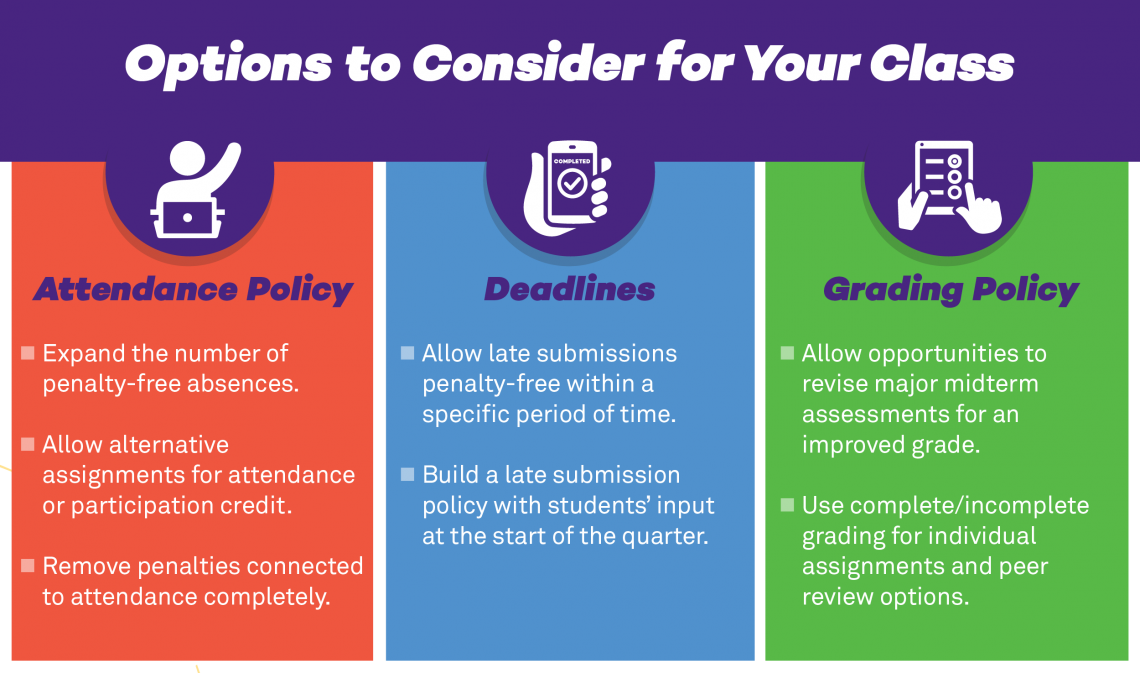There are just a few remaining weeks of summer break and Dr. Roberts takes advantage of a shady seat outside a coffee shop to finalize her syllabus for the fall. Equipped with caffeine and a snack to help her power through the task, she alternates between her fall 2019 and fall 2020 documents, pondering what will work for the upcoming quarter.
Looking at her pre-pandemic attendance policy, Dr. Roberts is already concerned about the potential of students missing class throughout the upcoming quarter. She decides to keep her more lenient policy from 2020, which increased the number of classes students could miss without penalty. Digging in a bit more, she considers the weekly quizzes she implemented during remote learning. She was pretty satisfied with the quizzes last year. She decides to continue weekly quizzes this year since they helped her track student comprehension of the course concepts. Best of all, she’s written most of the quiz questions and can just copy them into this quarter’s Canvas site.
Now halfway through her cup of coffee, she continues thinking about student comprehension. If they’re floundering at midterm, how could she address that, rather than just hoping they improve before the final? After a few bites of croissant and a review of her major midterm assessment, Dr. Roberts decides to include an option for students to submit revisions of that assessment for an improved grade. To offset the increased grading load that revisions create for her, she changes several smaller assessments from letter grades to complete/incomplete grading.
With her coffee mostly gone, Dr. Roberts continues building her syllabus, blending old and new ideas to create course policies that can flex with whatever challenges the fall quarter brings her and her students.
As we've seen more than ever over the last 18 months, unexpected circumstances can come at us quickly. Do you have policies in place that can flex with disruptions or changes you or your students may experience?
Below are some ideas to consider for adapting your course policies to be more resilient to disruptions.
* The Next Normal series from Teaching & Learning Technologies is designed to showcase creative ideas and adaptive approaches to course design. Your department, program, or college may have specific expectations regarding attendance, late work, and grading policies. Please refer to your departmental or school policies before making major changes to your course. For syllabus statements related to COVID-19, please see the Registrar's webpage.
Additional Ideas to Consider
- Be creative with assessments. Are there alternatives for in-class, graded activities that you are planning? How will you adapt if you or your students are unable to be there in person for major assessments?
- Keep your tech skills fresh. Utilize Zoom for office hours or schedule a Zoom meeting in Canvas for practice so that under pressure you are comfortable with the process.
- Utilize classroom and department resources. Once you're in your classroom, consider how you might utilize that resource for in-person student engagement and disruption planning. For example, is there a camera in the room so that if a student cannot be in class you can set up a recording for them? See what microphone resources might be available to you so that students can easily hear you when masked.
- Find a teaching partner. Don't have a co-teacher, TA, or department assistant to call upon if something comes up? Work with a trusted colleague who can pinch-hit for a lecture or help set up equipment in a classroom and do the same for them.
Communication is Crucial
Tell students in your syllabus or at the start of the quarter how you will communicate important messages with them throughout the quarter. Don't assume you can tell them in class! Whether you will use Canvas Announcements, email, or another form of communication, be consistent from the start of the quarter so that students know where to find messages from you.
- Communicate expectations with TAs. If you are unable to physically be in class, are they able to step in for a lecture? Are they comfortable facilitating a Zoom session? At the start of the quarter, discuss your plans and backup plans with TAs so they know what to do if something comes up.
Northwestern instructors and students have adapted to incredible circumstances over the last year. As we head into fall 2021, keeping flexibility and student-centered practices at the heart of our course design will help us weather the challenges the quarter may bring.
Additional Reading
- Considerations for Another Uncertain Semester: https://www.insidehighered.com/blogs/just-visiting/considerations-another-uncertain-semester
- 10 Course Policies to Rethink: https://www.chronicle.com/article/10-course-policies-to-rethink-on-your-fall-syllabus
- Alternative Final Assignment Tips and Tricks: https://canvaspost.northwestern.edu/2020/12/07/alternative-final-assignment-tips-and-tools/
- Keep Teaching video series: https://digitallearning.northwestern.edu/keep-teaching-video-series
Teaching & Learning Technologies is here to support you in your prep for the fall. Schedule a 1:1 consultation to discuss these or other ideas for your fall courses.

